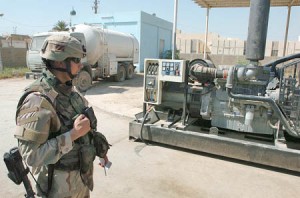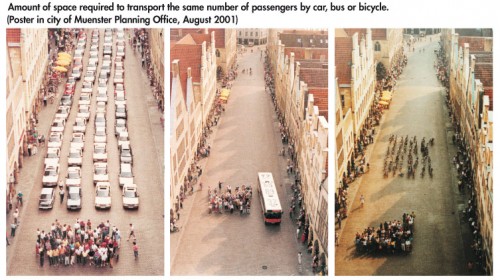I’m not always happy with Cost/Benefit Analyses to justify infrastructure investments. Induced economic activity has especially frustrated me because I don’t believe that an extra highway exchange can be justified just because it spawns a Wal-Mart. Too often we see these studies that proclaim a net benefit when in reality the private sector gains a new source of profit while shifting cost and risk to the public (similar to the privatization of Parking Programs).
An interesting case study comes to us from the nation of Iraq. After losing much of their infrastructure in the war and aftermath the people are now struggling to restore basic services. One key issue is electrical power reliability. Here in Indianapolis it is major news when we lose the power grid for any length of time, so I hope nobody ignores the suffering of Iraqis who spend the majority of each day with none or intermittent power.
A side effect of this has been a huge market for small-scale electrical power generators. Communities are chipping in together to purchase their own power infrastructure. So, the destruction of Iraqi power infrastructure has induced demand for generators, but is this a good thing?

Well, diesel generators don’t come cheap, and neither does their fuel. It seems fairly obvious the people aren’t investing in generators because they want to become more independent of public infrastructure. No, they are purchasing them because they want a reliable electrical supply and their government can’t provide it.
This is a similar condition to 20th century US transportation system. As cities and towns began dismantling their public transit systems, Americans began purchasing cars in like nowhere else in the world. In this case, a lot of people were forced to invest in transportation because the government failed to provide it. And auto sales thrived on the uncertain future of public transit.
Very few people benefit when public infrastructure is allowed to fail. After all, you can only add so many cars to the system before the high costs of maintaining all those vehicles, roads, and bridges begins to outweigh any benefits we once got from them.
Simply stated, collectively owned public transit is a great solution to our transportation needs. In fact, the service cuts in Chicago and NYC transit have shown how declining investment in transit can be a disaster. If we want to see the right kind of economic growth taking place in our cities, then its time to fight for heavy investment in public transit.

A good framework for this problem is the Parable of the Broken Window. Basically, you don’t create value by destroying something, even if new economic activity is generated. In this case, Americans did gain a highway system and millions upon millions of new cars and new jobs (manufacturing and road repair), but losing our public transit systems means we lost our urban way of life. A proper accounting of the situation should include all costs, especially the hidden and social ones.
For more information on Indianapolis’ proposed transit system, see Indy Connect. If you want to know what transit can do for our cities, Human Transit has a great discussion. If we want economic growth in our cities without endless sprawl, transit is the best answer.
Good summation of all the associated facts. Hopefully, our leaders will get mass transit improvements right here with Indyconnect. Hopefully, the final plan isnt AS suburban in nature as well.